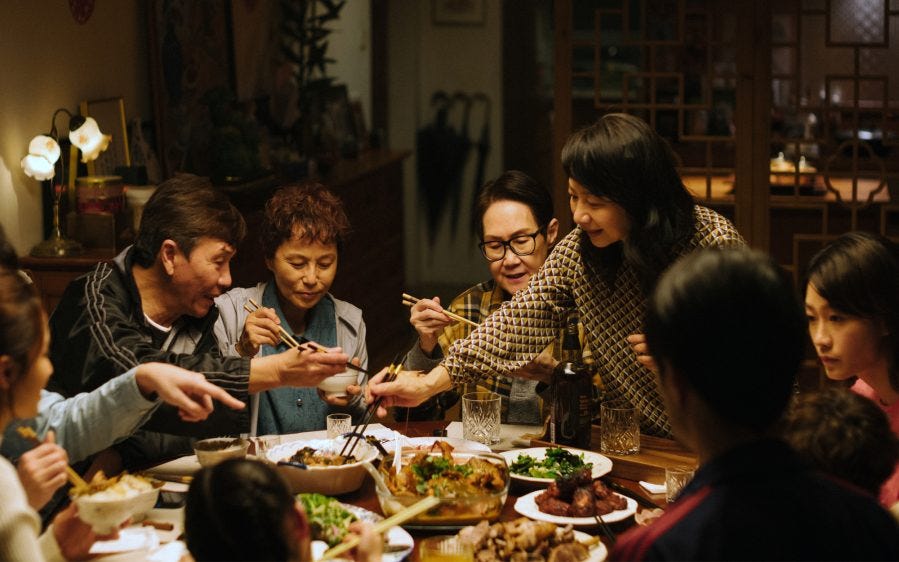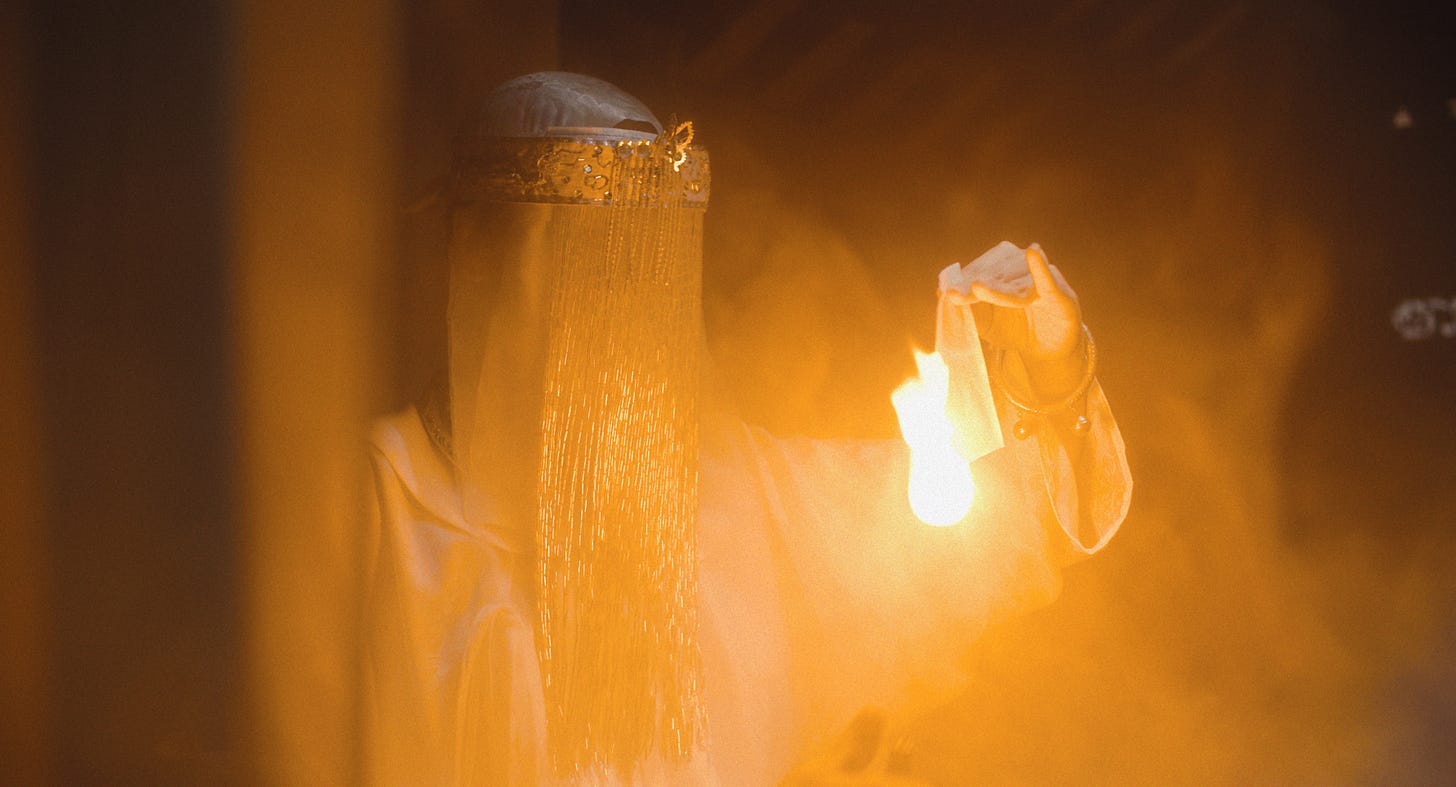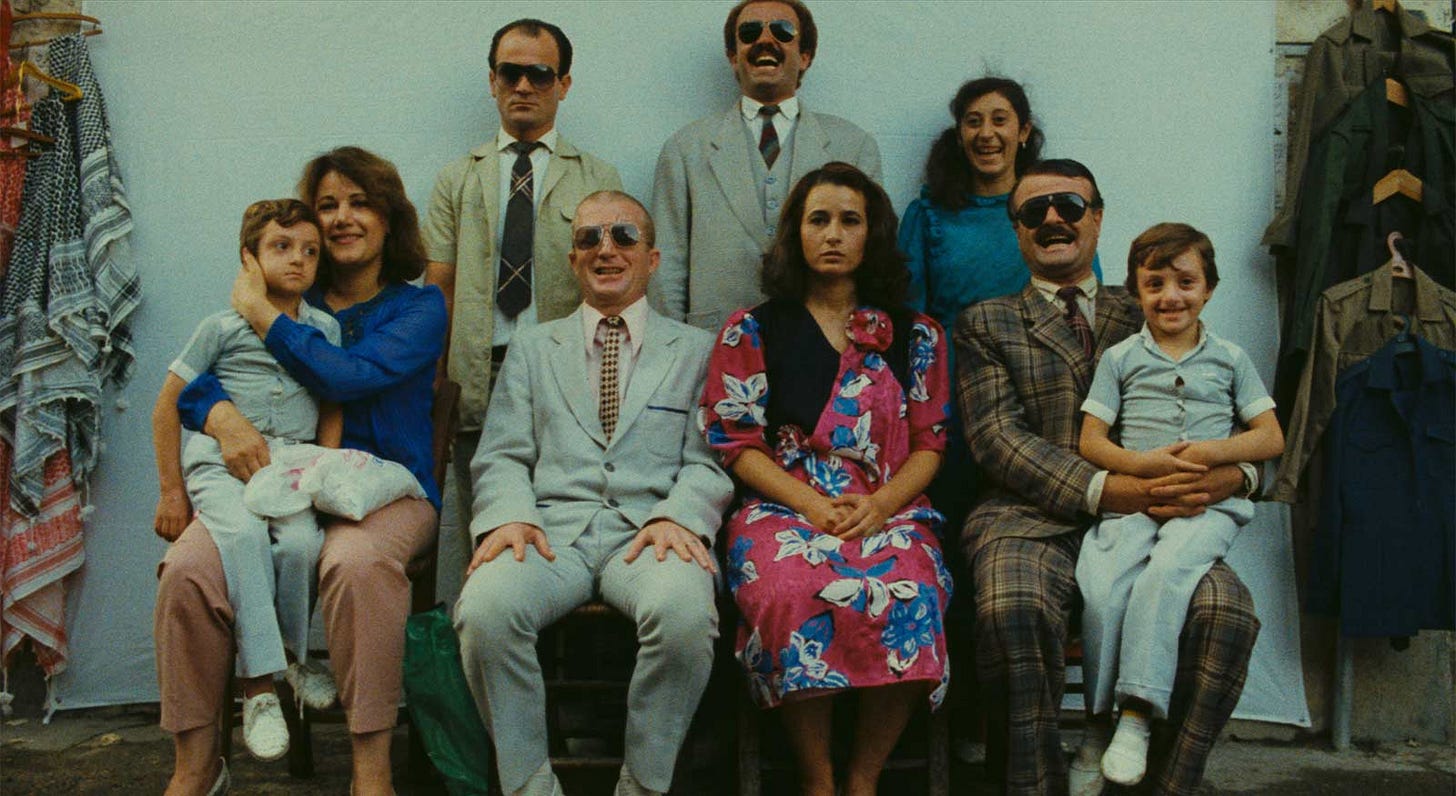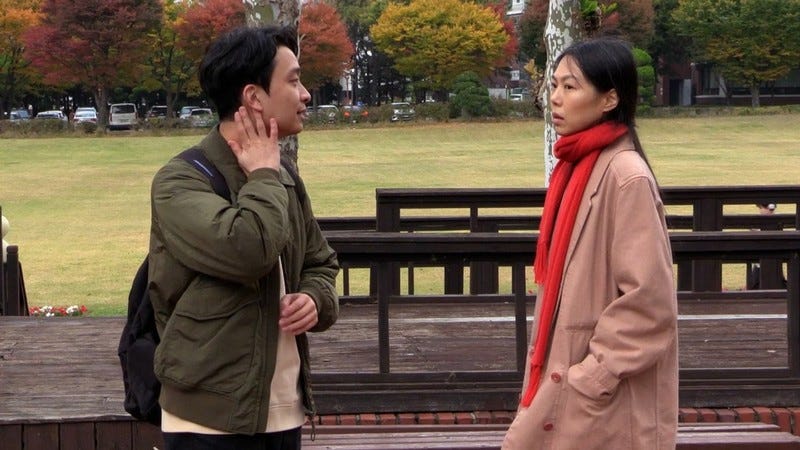SGIFF35 Recap Part 1
Brief thoughts on the films I've been catching at SGIFF35, including Stranger Eyes, All Shall Be Well, By The Stream, and more. Part 2 forthcoming!
Hey friends, I am writing from the 35th edition of the Singapore International Film Festival! I have kindly been bestowed a "Cinephile" pass which is letting me into (almost) every screening so far and having a great time. This is a mid-festival recap of the first half of the festival for me. I would not go so far as to call these reviews; they’re brief thoughts in response to the films.
In the order that I watched them:
Stranger Eyes - directed by Yeo Siew Hua
The festival opened with Yeo Siew Hua's follow-up to his Golden Leopard winning A Land Imagined, Stranger Eyes. Featuring a familiar plot structure from his previous entry with distinct perspective shifts, Stranger Eyes concerns a young couple searching for their kidnapped daughter as a strange man (played by Screen Icon Award recipient Lee Kang-sheng) observing them begins to reveal himself. Lee Kang-sheng's involvement is a highlight, and he still lights up the screen. Even in scenes where he is just sitting on a park bench, he can imbue it with a cinematic strangeness that is compelling to watch.
Thematically, director Yeo has a lot on his mind regarding the pervasive surveillance culture within Singapore, both imposed by the state, as well as the organic social surveillance we practice as we observe each other among stacked apartments and crowded malls. The film's thesis presumes an intrinsic suspicion of our neighbours, to suspect ill intent from innocent gestures and how we project upon others to turn ourselves into the heroes of our own stories.
The film plays like an arthouse riff on Rear Window, with telephoto lenses observing from across apartment blocks. The film is at its best when scenes remain wordless observations of characters tailing each other. I enjoyed the depiction of quotidian public spaces like malls and playgrounds that remained unembellished and distinctly bland Singapore, even if they can be at odds with the more stylistically heightened sections.
The film remains a largely unemotional affair despite the horror of a kidnapped child, preferring to engage with the ways the two male leads become obsessed with each other. Unfortunately, I think that emotional quality is necessary to increase the stakes of the situation. Without the threat of tragedy, the film comes across as a formal exercise with only a cursory engagement with its themes of surveillance.
From a narrative structure perspective, there's an inelegance to the way the film is built, especially when Xenia Tan's supporting character finally appears in the film's final quarter. However, despite its unbalancing of the film's shape, her character's arc introduces a dimension of compassion that had not been explored previously. It suggests the possibility that our constant looking over each other can manifest as an act of love. Even if it does not work completely, I think it's commendable how Yeo moves us into completely new territory when it seemed he had already exhausted what he wanted to say.
All Shall Be Well - Directed by Ray Yeung
Ray Yeung's follow-up to 2019's Suk Suk was quite a surprise for me. In All Shall Be Well, Pat and Angie, an older lesbian couple in a loving relationship, seem to have been largely accepted by their respective families. When Pat passes away suddenly without a will, Pat's family begins to eye their legally entitled inheritance from Pat's death, and Angie has to wrest control over Pat's death rites and the apartment that's rightfully hers.
While the film's setup seems to lay out a typically melodramatic plot, Yeung practices immense restraint with his subject material, inspired by true stories, and chooses instead to present the situation quite plainly, showing an approach that is both mature and intelligent.
I went into the film hoping for a sweeping emotional experience, and Yeung presents something completely different to what I expected, crafting a story that is sober and pragmatic. Scenes are presented simply, with simple fade outs to close out scenes. Angie is consistently met with tiny injustices from Pat's family, and yet she largely maintains composure, making decisions that honour Pat without disturbing the hornet's nest. While part of me still wishes it had greater immediate emotional impact, I think any effort toward grand catharsis might have cheapened Yeung's intentions here.
The writing has further details that elevate itself. Characters routinely refer to Angie as "Pat's best friend" rather than romantic life partner and for nearly the entire film we never hear anyone refer to Angie as Pat's lover or partner. The only time this pattern is broken is in a late reveal of Pat's will wherein Angie is referred to as her life partner. This unspoken relationship, only manifesting in this elusive legal document operates as a subtle surprise that affirms their relationship while most of the film has strategically elided defining it in concrete terms. The film may not be the cryfest I was hoping for, but for people who have had experiences close to what Pat and Angie have, the film will surely ring true.
Don't Cry Butterfly - Directed by Linh Duong
Linh Duong's debut feature Don't Cry Butterfly showed promise with its turn towards the mystical and spiritual. In it, Tam deals with the discovery of her husband's infidelity by approaching a spiritual “master” and her daughter dreams of studying abroad. I appreciated that Duong imbues the film with humour, and utilises a diverse colour palette that lightens the tone of the film, which feels rare in contemporary Southeast Asian cinema these days. There's a great gag of policemen needing to meet their "suicide saving quotas" and mistaking the main character as a woman on the brink because she's standing on a bridge.
There are nice details in the film's tiny world building, like Tam's job as a wedding planner, but I find that the film relies too heavily on its surreal and mystical elements to engage, without building actual dramatic arcs for its characters. Mother and daughter's plots feel distinctly unrelated, and despite their blood relation their relationship is neither explored or juxtaposed in a way that points toward any grander purpose of its investigation into its themes of womanhood in Vietnam.
Universal Language - Directed by Matthew Rankin
Matthew Rankin's Universal Language was a confounding affair which I was not quite sure how to approach. The director himself appears in the film playing a character named Matthew Rankin in Winnipeg, Canada looking for his mother, as two young children look for a way to retrieve a cash note encased in ice. The film presents Winnipeg as if it were Tehran as a sort of homage to Iranian cinema, with characters largely speaking in Farsi and the landscapes rendered flat and beige.
The film makes direct references to Iranian cinema, with a shot of a car descending a multi-story carpark looking very reminiscent of a similar one in (I think) Kiarostami's Taste of Cherry, where a car descends down the winding path of a hill. There's an off-kilter charm to the film's comedy, with odd characters like the world's most boring tour guide bringing tourist's around Winnipeg's mundane sights, and kids exasperated by adults looking to establish their authority.
There seems to be a personal bent to the film's emotional core that feels impossible to access without knowing Rankin personally which I think makes the film feel a little distant, like a game that Rankin plays that we do not know the rules of. Then again, a lot of famous Iranian cinema has also had self-reflexive bent, so it could be Rankin playing into those tropes as part of his homage. However, the obtuse nature of his approach and in presenting Winnipeg as specifically Iranian, he flips the power of the best Iranian cinema: the ability to make their specific stories in Iran somehow feel like the rest of the world.
La Cocina - Directed by Alonso Ruizpalacios
I had high expectations for Alonso Ruizpalacios' La Cocina having read some comparisons with The Bear. Having seen the film, I think those comparisons matched setting on a superficial level but not tone. While The Bear similarly depicts a high tension kitchen with frequent arguments and flared tensions, it has an underlying degree of tenderness among its characters that keep the kitchen and relationships afloat. La Cocina, however, has an insufferable character at its centre, with very little to redeem him even if the film tries to make him sympathetic with his dreams of becoming a naturalised US citizen. Raúl Briones' Pedro is frequently mean to everyone: peers, superiors and his lover played by Rooney Mara. He wants but rarely does he give. While I have loved films with horrible main characters, Pedro's construction as a character gives you very little to align with, whether from a goal perspective (understanding what he wants and how tries to get it) or an experiential one (enjoying his badness).
The film is based on Albert Wesker's 1957 play The Kitchen, which I know next to nothing about, so can only judge it based solely on the film itself. It does have impressive sequences, with a central set piece where the kitchen floods with cherry coke, but it is in service of very little narrative purpose. Without any characters to root for, the chaos of that scene feels feckless and further appeals to audience sympathy are also fairly ineffective. Oddly, the film begins with Anna Díaz's Estela coming to the restaurant for work as an underaged undocumented worker but her arc goes nowhere, immediately subsumed into Pedro's journey to make everyone hate him. The film postures toward being thematically about undocumented migrants or working class concerns, but seems too busy trying to impress you with bravura sequences or fits of crude vulgarity to say anything at all.
Stars in Broad Daylight - Directed by Ossama Mohammed
I had never heard of Ossama Mohammed or his films prior to the festival, and am glad to be introduced to him and his work through the festival's Landmark programme. Mohammed's feature debut, Stars in Broad Daylight, was banned from public screening in Syria and he now lives in exile in France.
Mohammed was in town for the Q&A for the screening which gave the necessary context to help parse the film. I am not the right person to appropriately analyse the film which is an allegory for Syria's totalitarian regime through the realm of family and marriage. The brother of the family, Abbas, hopes to control his family through marrying his sister off to the right cousin, ignoring any of her true desires. Even as she resists his patriarchal power, Abbas enlists family to further his subjugation of her autonomy, while secretly keeping tabs on his entire family through the telephone operator job that he has. Abbas is an obvious stand-in for the secret police, except in this film his domain is the family.
Mohammed's image making is metaphorical, with frequent maps of Syria in the mise-en-scene and a marriage scene being played live on television screens like a national broadcast as Abbas and co-conspirators flaunt their patriotism. There's also frequent playful deployment of mirrors to expand the space, and these can sometimes function metaphorically as well. As Mohammed explains, in one scene the mirror sits high in the frame like a framed picture of a president high on a wall, as the power dynamics shift in the scene, the individual framed in that mirror changes to reflect shifting control.
To think that this is Mohammed's first feature from way back when, supported by a remarkably casted troupe of first-time actors, is astounding considering its density of ideas and ability to match image to message. Mohammed watched his film again with us for the screening, and you can tell he still pines for his home in Damascus where he shot it. It's an immense pity he will never be able to return. Sometimes, the more you love a country, the more it will want you out.
Vive l'amour - Directed by Tsai Ming-liang
The Vive l'amour screening was introduced by its stars Yang Kuei-mei and Lee Kang-sheng which was an unexpected highlight. I wasn't able to attend their In Conversation event, but I heard it was very entertaining, with the two balancing each other's energies very well. This year is the 30th anniversary of Tsai Ming-liang's arthouse classic, and it was a real treat watching it with an audience that resonated with it.
I had completely forgotten that I had seen it 6 years prior and it felt like an entirely new experience. Tsai has always been a difficult filmmaker for me to engage with due to his style's inherent slowness but I now think Vive l'amour is his most accessible work. It is consistently engaging despite its lack of dialogue because at every turn you either know what a character is trying to do, or are trying to figure it out. Revisiting a film always has a chance for a reassessment, and I came away this time completely spellbound. I've loved seeing how my tastes have evolved over the past decade.
Despite being a portrait of urban loneliness and ending with Yang Kuei-mei's famous crying scene, it exudes immense warmth. The unexpected friendship between Lee Kang-sheng and Chen Chao-jung's characters is a highlight; a display of how quickly suspicion and animosity can soften and turn into a warm meal around a hot pot.
By the Stream - Directed by Hong Sang-soo
New Hong Sang-soo always merits a watch because, even despite his prodigious output, he finds new ways to innovate and experiment within his carved out niche. The Kim Min-hee starring By the Stream is a light comedic affair, as they all are, and concerns a skit being performed by students at a women's arts school and the surrounding drama around this seemingly tiny and inconsequential performance.
There's a political reading of this that I was clued into by Emerson Goo's very detailed review here which completely went over my head watching it. In a way it forms a nice complement to Stars in Broad Daylight in the way it uses allegory to make a political point. Hong's approach however, is exceedingly light, side-tracked pleasantly by minor romantic entanglements and conflicts. There are fun scenes here, but I did wish he was sharper with his intent this time round. Watching Hong's films have always felt like a narrative game where the audience must figure out the elusive story underlying Hong's simple plots. However, in this one, figuring out the possibly metaphorical intent does not feel quite so satisfying.
On a separate note, it is always a joy to see Kim Min-hee again, even if it's only in Hong films. Her performances are always so immediate and empathetic, and she plays anger in a way that feels mercurial and endearing. I'm also enjoying the continued presence of recent Hong regular Ha Seong-guk who plays the student director three-timing three of the students in the skit with an insecure pompousness that's a delight to ridicule.
Don't You Let Me Go - Directed by Leticia Gorge & Ana Guevara
I have been collecting films to add to my Best Friend Cinema Canon list for a while now and was hoping that Leticia Gorge and Ana Guevara's film might be a worthy addition. It presents a flashback to an idyllic autumn between best friends Adela and Elena, before Elena's untimely passing. Opening with Elena's funeral and then whisking Adela to the past, the film is chock full of playful banter and idealised friendship.
However, I long realised that the best Best Friend Cinema requires some level of conflict between its central pair. With Elena's passing, Adela's remembrance of her friend is of pure love and admiration, and is lacking any friction. Without any measure of interpersonal conflict, the relationship depicted in this film instead feels hollow and untested. It is only with the rough edges that true friendship takes shape; without the bad, how can the good be perceived?
The Shrouds - Directed by David Cronenberg
It is always exciting to see new work from David Cronenberg, one of our greatest warriors of freak cinema. Eli previously saw it at NYFF and covered it on our podcast and was unfortunately underwhelmed, and I came away feeling similarly. In The Shrouds, after the overwhelming grief of his wife's death, Karsh invents GraveTech, which allows one to watch the bodies of your loved ones decomposing in their graves. There are promising diversions into Cronenberg's exploration of new technology, and I'm still impressed by Cronenberg's ability to come up with fresh, specific, and somehow believable sci-fi contexts with a strong technological bent.
However, Cronenberg strays too far from his roots of body horror, finding himself (literally, Karsh is a clear stand-in for Cronenberg) in stilted scenes of unnecessary extended exposition. There's too much world building here without any emotional release or visceral catharsis, and it is frankly a bore. The performances are also extremely stiff, maybe intentionally so, as if every character were a walking and talking corpse.
Notes
It’s been quite nice chatting with old and new friends during the festival, which I mostly missed last year. I think the nature of having the theatres all spread out is that there is not really a natural or central place to congregate except when outside the theatres. Discussing films while in the rush queue / outside theatres after films have ended has been quite fruitful, and they do make the viewing experience more social and meaningful. I’m wondering how we can cultivate a culture like this outside the festival setting.
Anyway, that's all for the first half of my festival watches, up to Tuesday. There'll be another piece like this after the end of the festival to cover the second half. I'll also be chatting about all the films I caught with Wilson and Eli on Deep Cut, stay tuned!
Also, films I’ve seen since Tuesday: An Unfinished Film (I got turned away at the first screening, and missed the Q&A!); No Other Land; Viet and Nam
Remaining films I’m planning to see: Happyend; Time To Be Strong; The Circle; This Is Not a Film








